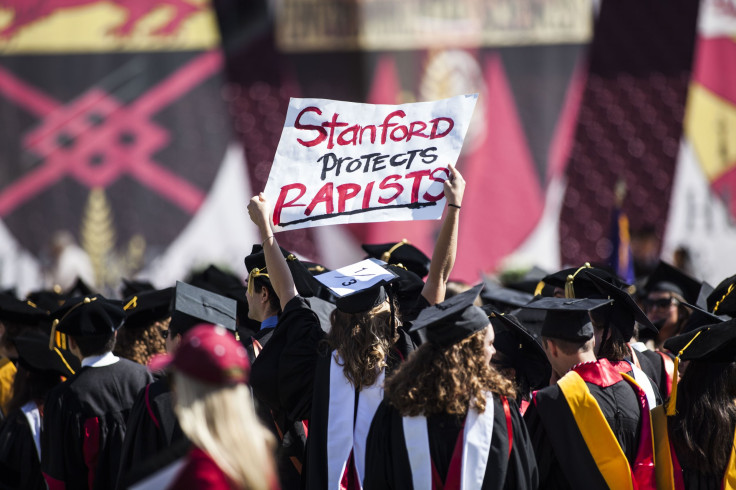Stanford Rape Case Update: After Brock Turner Controversy, University Bans Hard Liquor

Stanford University just made some new rules in the wake of a controversial campus rape case, but the new policy is probably not what students had in mind when they protested the university's inaction on the Brock Turner rape case at commencement ceremonies in June.
Stanford University has banned hard liquor at undergraduate parties on campus, according to the Associated Press. School officials did not present the new policy as a direct response to the rape conviction and controversially lenient sentencing of former student Brock Turner in June, but the ban all the same appears to signify that addressing binge drinking is greater priority for the university than rape culture.
President John L. Hennessy and Provost John Etchemendy announced the new student alcohol policy in a letter to students Monday, describing the ban as part of an effort "to build a healthier campus culture around alcohol." According to the campus newspaper the Stanford Daily, the new policy does not apply to beer and wine, which will still be allowed at on-campus undergraduate student parties. Hard liquor, as defined by the new rule, constitutes drinks that are more than 20 percent alcohol by volume or more than 40 proof. Resident Advisers and other campus officials have been contacted about helping to enforce the law. Hard alcohol use will be allowed at parties hosted by graduate students and only in the form of mixed drinks.
The timing of the new ban makes it impossible not to connect the university's efforts to curb the dangerous behavior it alleges stems from binge drinking and alcohol abuse on campus to the controversial rape case that rocked the university not even two months ago.
In June, Brock Turner, a 20-year-old swimmer on scholarship at Stanford, was convicted of assault with intent to commit rape of an intoxicated woman, sexually penetrating an intoxicated person with a foreign object and sexually penetrating an unconscious person with a foreign object. He faced as much as 14 years in prison, but was instead sentenced to just six months behind bars because Santa Clara County Superior Court Judge Aaron Persky said he believed a longer sentence would have “a severe impact on him,” according to multiple media outlets.
The lenient sentence came under even more scrutiny after a powerful letter to Turner from the unidentified victim brought the case to national attention and Turner's court statement seemed to pin the blame for his actions on alcohol.
"I’ve been shattered by the party culture and risk taking behavior that I briefly experienced in my four months at school," Turner told the court. "I made a mistake, I drank too much, and my decisions hurt someone."
Turner was banned from stepping foot on Stanford's campus, losing his scholarship and standing as a student, but critics urged the university to take more steps to address sexual assault on campus in the wake of national discussion about rape culture on college campuses. The new policy on alcohol, coupled with the lack of complimentary or previous new policy on sexual assault protocol, implies, fairly or not, that the university sides with the sentiments in Turner's statement that alcohol is at the core of such problems.
Sadly .@stanford appears to agree with #BrockTurner that "alcohol" and "party culture" are to blame for his conduct. https://t.co/A9jw82KjsJ
— Michele Dauber (@mldauber) August 22, 2016
© Copyright IBTimes 2025. All rights reserved.






















